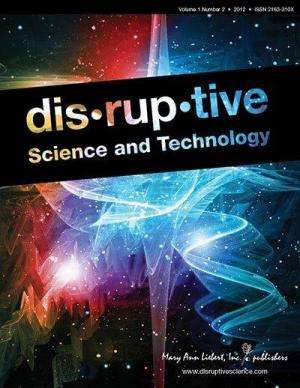©2013 Mary Ann Liebert, Inc., publishers
Platelet-rich plasma (PRP) derived from blood contains growth factors and other bioactive molecules that promote healing at sites of tissue injury. However, it is difficult to deliver and retain these molecules at a target site, and clinical results have proven to be mixed – until now. A new solid form of bioactive plasma-based biomaterials, known as PBMs, can accelerate tissue healing. Not only are PBMs easier to work with, inexpensive to produce, and safe to use, they are available as off-the-shelf products. All of these promising advantages, and the potential to use PBMs to enhance healing of difficult-to-treat connective tissue injuries affecting cartilage, tendons, and ligaments, contribute to their unique possibilities as described in the article "Biologically Active Blood Plasma-Based Biomaterials as a New Paradigm for Tissue Repair Therapies," by Smith et al. in Disruptive Science and Technology.
Authors Jason Smith and Alan West, Carmell Therapeutics Corp.; Lee Weiss, Robotics Institute, and Phil Campbell, Institute for Complex Engineered Systems, Carnegie Mellon University; and James Burgess, Department of Neurosurgery, Allegheny General Hospital, Pittsburgh, PA, describe initial studies with PBMs in which they were successfully used to stimulate the repair of a bone defect in a mouse. They conclude that "PBM products have the potential to accelerate healing and reduce pain and complications, enabling patients to return to work and their daily lives more quickly." The authors further discuss the development of the PBM technology, its potential applications, advantages over existing treatment options, and the barriers still to be overcome for clinical implementation.
According to study author Alan West, "There has been much recent interest in the concept of using natural regenerative factors to heal wounds – the use of autologous platelet-rich plasma is seeing wide-scale clinical use for treating musculoskeletal and other injuries. Our plasma-based biomaterials move this concept a quantum leap forward, with materials that have the potential to disrupt the industry with a new category of biologics that are inexpensive to produce, safe, and robust in healing both bone and soft tissue injuries."
"There is a significant need for effective, consistent, and cost effective products that can biologically enhance tissue healing," says Editor-in-Chief Alan J. Russell, PhD, Highmark Distinguished Professor, Carnegie Mellon University. "By being cost effective and readily available, PBMs can benefit a wide population of patients in healthcare systems. The research Smith and his colleagues have published has the potential to benefit not only the First World Countries, but also could be practical options for developing nations."
More information: The article is available free on the Disruptive Science and Technology website at http://www.disruptivescience.com.
Provided by Mary Ann Liebert, Inc



















